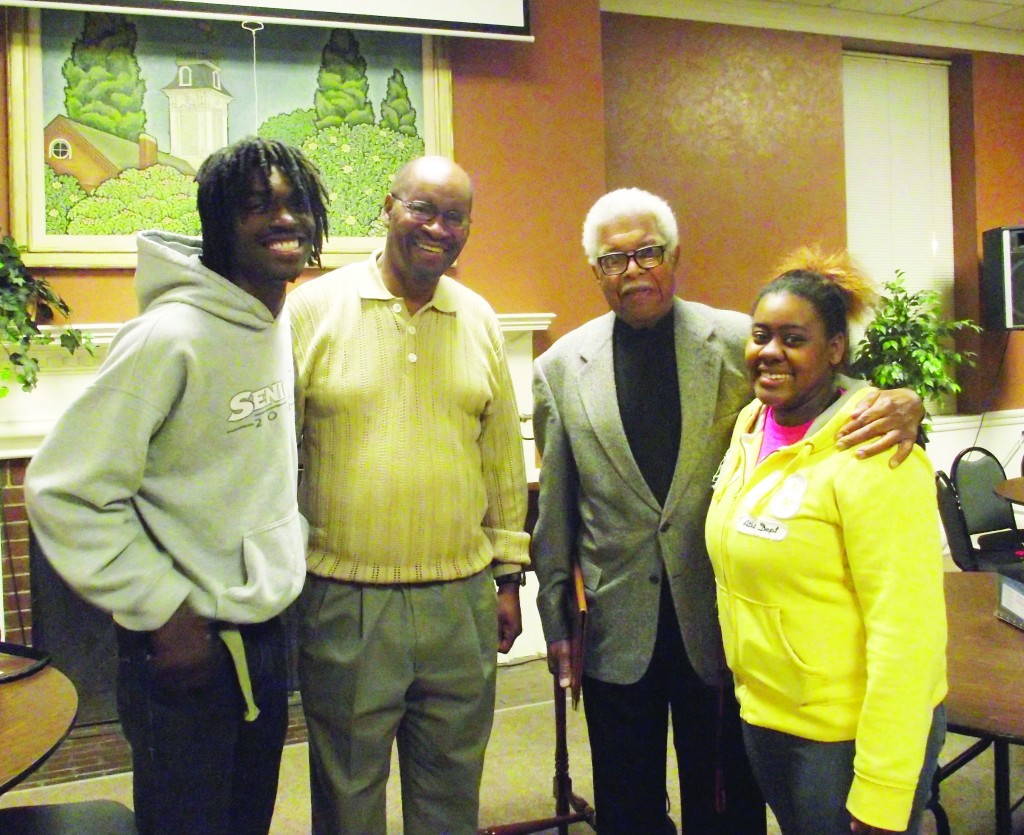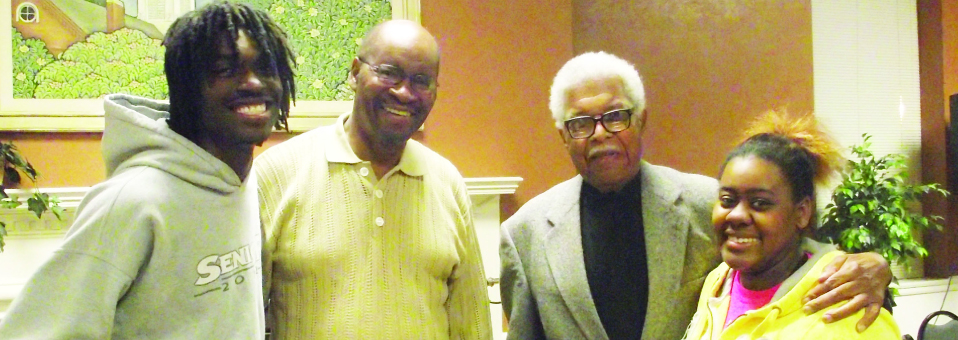Robert Kirk and Don Hickman share perspectives at ‘How It Works’ series

(From left) Freshman Xavier Sales, speaker Don Hickman, Dr.Bob Kirk and senior Jerica Johnson attended the ‘How It Works’ series Wednesday night.
On Wed., Nov. 28, Maryville College’s department of multicultural affairs hosted Dr. Robert Kirk, the first African-American professor to receive tenure at the University of Tennessee, to speak to students about racial diversity and prejudices. Former FBI agent and MC alumni Don Hickman also spoke as a discussion facilitator and provided his unique perspective as an investigator of public corruption and government fraud.
Students from a variety of backgrounds met in the Proffitt Dining Hall to listen to the two men depict their unique experiences involving racism, discrimination and desegregation. The department of multicultural affairs hosted this event as part of their “How It Works” program, a monthly series hosting various speakers to bring light to issues of prejudices and discrimination on campus.
Kirk last spoke at MC in 1968 after he being selected as the first African- American department head at UT. He depicted his personal experiences through desegregation to the present day, including his achievement of an undergraduate degree at Fisk University, a historically African- American college, and his graduate degree at Indiana University. After being accepted to I.U., he was notified that because of his institutional identification, he would be required to take two prerequisites.
Kirk compromised with the university’s president to take one of the assigned classes. The manner that he handled himself and dealt with his issues was impressive enough that the professor who had impeded him from the beginning of his semester became one of his closest collogues. Kirk also spoke about his time spent in the military during the Korean War. When he went to request an exemption so he could complete his education, he was denied although many of his other friends were all given exemptions. However, Kirk’s situation turned to his advantage with the benefits that come from being in the military.
“When I look back at it in the long run, it was probably one of the best things that has ever happened to me even though I thought at the time I was grossly discriminated upon,” Kirk said. “I finally moved from considering myself as a victim to considering what could possibly be one of the best experiences I have ever had.” Hickman also spoke about his experiences and gave his professional opinion into why people discriminate. His conclusion was how people perceive warmth and competence in other people, especially during first impressions. He explained to the audience how to avoid discrimination and the prejudices of others while also warning them on forming ones of their own.
“Discrimination is much more subtle today than when I was you age,” Hickman said. “Pick your battles large enough to matter, but small enough to win.” Hickman, as an alumnus of the college, spoke as to why he chose MC instead of a predominately African-American school. Hickman said his father told him “the world is made up of black and white people, not black or white people. So, go to a place where you can learn to get along with others now while you’re young.”
Larry Ervin, director of multicultural affairs, also announced at this time that the department of multicultural affairs, in cooperation with Vandy Kamp, dean of the college, would be creating a new award to be given out at the annual Maryville College Leadership Awards. The award will be given to the club or group of individuals who create the best event that encompasses the year’s theme, which for this year is “Smiling Faces.” Ervin said to expect advertisements for this soon. Student response to this workshop was positive with many students excited to attend a second discussion.
“I think having theses kind of workshops will help the students on campus realize that just because it’s not as blatant and hardcore does not mean it’s not happening on campus,” said Jerica Johnson, president of the Black Student Alliance.
“So, having these types of workshops shows that diversity is a huge part of Maryville College…What I would like to see as it goes on further is to have somebody of different diversity to come and speak to show that discrimination is not just a black and white thing.”
“It was a quality event,” said Stacy Padilla, a sophomore in attendance that night. “I’m surprised that I didn’t hear more publicity about it because it was really interesting and really informative. I think that the whole purpose of the multicultural department is to include the whole campus and different groups and unite us to understand each other better. I’d like to see a bigger event with more [student] participation.”

